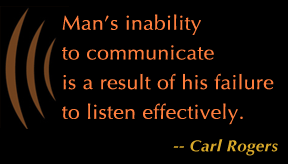 Many years ago I attended a powerful and memorable Reflective Listening workshop. The participants were asked to listen carefully as volunteers related a story about something in their lives the found disturbing or confusing. During the first stage of the exercise, the participants were instructed to warm-up their “listening muscles” by listening without any response or reaction whatsoever.
Many years ago I attended a powerful and memorable Reflective Listening workshop. The participants were asked to listen carefully as volunteers related a story about something in their lives the found disturbing or confusing. During the first stage of the exercise, the participants were instructed to warm-up their “listening muscles” by listening without any response or reaction whatsoever.
During the second stage, we were instructed to reflect back the facts of what we had heard (“Your landlord didn’t fix the sink even after you asked ten times”). In the two subsequent stages, we were asked to reflect back the emotions (“It sounds like that was frustrating to you”) and then the values (“It seems that promptness and reliability are pretty important to you”) we were picking up on.
We were asked to refrain from comment, interpretation, advice giving. If you are imagining that this was challenging, you are correct.
Most surprising to learn was that all of the individuals who had shared a story reported in their feedback that they had arrived at a new understanding of themselves or of the situation; had felt deeply supported and strengthened; or had achieved a new clarity and/or direction. Remember that we listeners had offered no advice, no feedback and no personal experience whatsoever.
* * *
This kind of listening entails two major components:
- Interest (curiosity) in what the other person has to say;
- Respect for the other person’s inner wisdom.
It is a kind of listening that comes from a place of empathy. By tuning in to another’s experience, emotional reaction and value system, we maintain that another person might feel or think differently than we might in any given situation. And in so doing, we shift from an egocentric “me and my world and my life experience” to that of our partner, friend or child.
This sort of listening affords others the satisfaction of feeling deeply heard and “known,” and empowers them to discover their own truth.